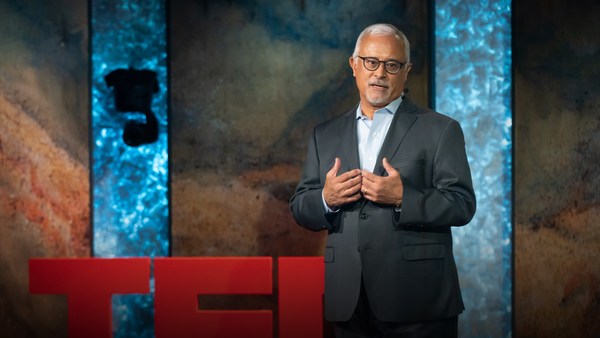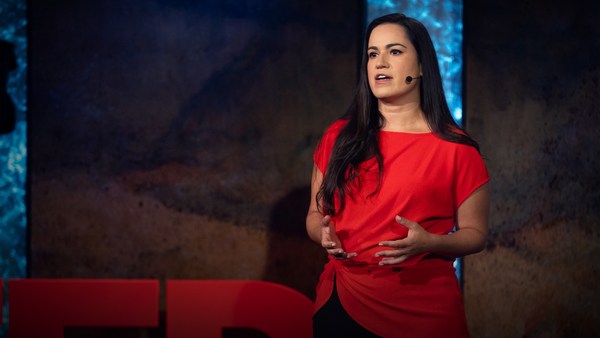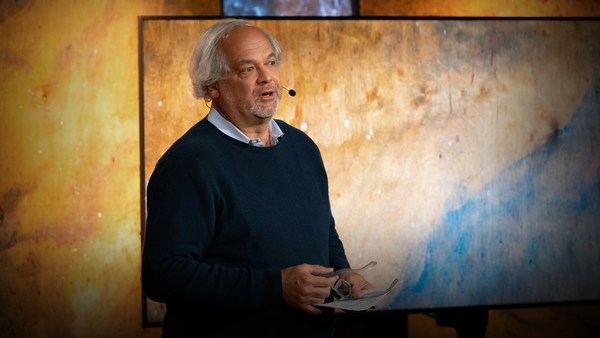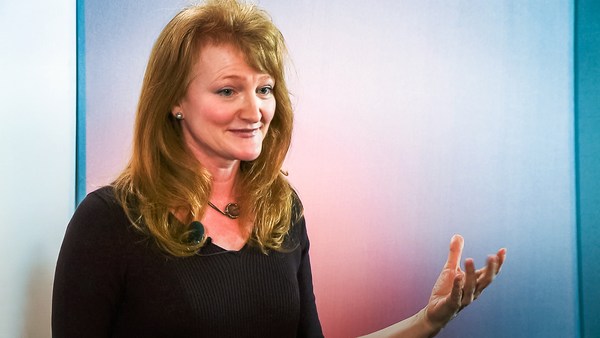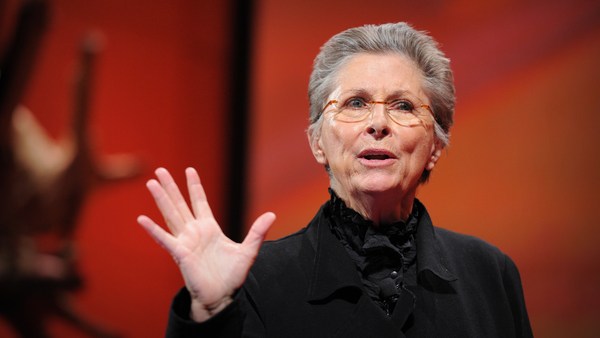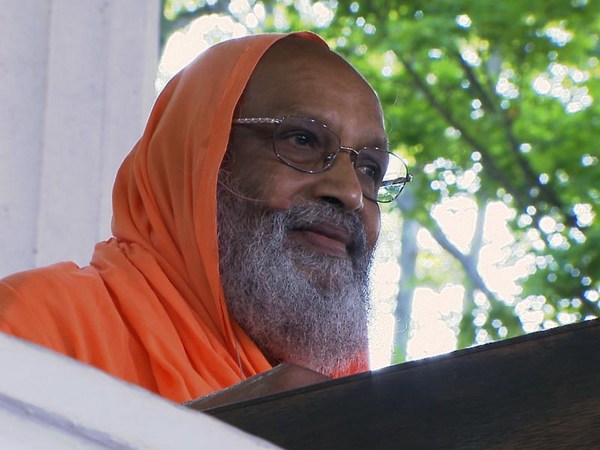I'm here to honor the sacredness of life that I see at the border in south Texas. In 2014, I visited a detention facility where hundreds of little children, immigrant children, were detained for several weeks in conditions that were very heartbreaking. They were dirty and muddy and crying. Their faces were full of tears. I had the opportunity to go in and be with them. And they were all around me. They were little ones, some of them not older than five years old. And they were saying to me, (Spanish) "Sácame de aquí." "Get me out of here." (Spanish) "Por favor, ayúdame." "Please, help me."
It was so difficult to be there with them. I started to cry with them, and I told them, "Let us pray." (Spanish) "Vamos a rezar." And they repeated after me, (Spanish) "Diosito, ayúdanos." "God, please, help us." As we prayed, I could see the Border Patrol officers looking through a glass window. They were at the verge of tears. As they heard the children praying and witness.
I had a little boy get close to me, closer, because they were all over, we could barely fit in that little cell. And this little boy tells me, (Spanish) "Ayúdame. Quiero irme con mi mamá." "Please, help me. I want to be with my mother. She is here, I was separated from her." I said to him, "Mijo, if your mom is here, I'm certain you will be reunited."
When I walked out of the cell, an officer got close to me and said to me, "Sister, thank you. You have helped us realize that they are human beings." You know, sometimes, no matter what job we have, we must never forget to recognize the humanity in others. Otherwise, we will lose our own humanity.
Let me tell you a bit about what I see and what I do in the southern border of the United States where I live and where I work. Hundreds of families enter the United States by crossing the Rio Grande river. And once they are in the United States, many of them are given permission to continue their process of immigration at another point in the United States. What has amazed me for all these years has been the amazing humanitarian response of the community there in south Texas. Thousands of volunteers have given of their time so generously. For me, they're all amazing people. And the whole community, city government, from local business leaders to civic organizations, all faith communities, in the Border Patrol and ICE. We have all come together in an effort to help 150,000 or more immigrants since that first day that we got started.
Back in those first days when we were first involved in helping the immigrants, we were at our respite center, and an officer from the city walks in and tells me, "Sister, what are you doing here?" I turned and looked to see what was happening at the respite center. I was amazed at what I was seeing. There were hundreds of volunteers helping so many families there that needed help. Giving them ways to get cleaned up and to get clean clothing, food, hygiene items. Just love and compassion was seen everywhere. So I turned back and I responded to him and I said, "Restoring human dignity. That's what we're doing." I don't think he expected that answer from me, because he took a step back and then approached me again and said, "Sister, if I had a magic wand, what would that magic wand do for you?" "Showers?" Sure enough, that evening we had a mobile unit of eight showers. Amazing. And after that, we had 100 percent support of the city government.
We were there, wanting to make sure that we were helping and be successful with our response to so many families that we were seeing every single day. I think that we must help others see what we see. I think it's important that we can share that with others.
You probably heard this idea before -- that we must always see God's children as equal. But in order to do that, I think it's important to be able to see them as people. To be able to have a personal encounter, when we can feel what they feel, when we can understand what they're hurting. To really meet up with them. It is then that we are present to them and we can make their humanity a part of our own humanity. And we'd recognize that we are all part of the same human family.
During those days, I had a lady approach me and tell me, "Sister, I am 100 percent against what you do, helping these illegal aliens." And I said to her, "Let me tell you what I do and why." So I shared with her and introduced her to the families and the children, shared the stories that they are living. When I finished talking with her, she turns and looks at me and says, "Sister, I am 100 percent in favor of what you do."
(Laughter and applause)
That evening, her husband calls me, he tells me, "Sister, I don't know what you did to my wife. But this evening she came home and she said, 'If Sister Norma ever calls you, you make sure you do what she tells you.' So I'm just reporting to let you know I'm here to help in any way."
Well, you know ... I'm thinking that -- was it a personal encounter that she had? I think it's a nice idea, a nice message, but I don't think it's the whole story. In that encounter, we must put aside our prejudice that we have toward others, that separate us and don't allow us to see them, our walls that we put up in our own heart that keep us separated from others. When we are able to do that, we're able to reach out to them. You know, I think what doesn't make it possible is fear -- that we're afraid. And because we're afraid -- more than likely it's because we've seen in the media all this negative rhetoric that we hear about immigrants, they are demonized, like they're not human, that we can discard them and we can get rid of them, and not even feel bad that we're doing that.
Immigrant families are not criminals. Immigrant families are like our families, like our neighbors. They're good people who are entering our country and coming to the United States only simply because they're fleeing away from violence and they want to be safe. Unfortunately, what we see at the border is terrible. People are hurting and suffering. Thousands of them are. And mostly I feel it's because of those walls that we put up, that we have in our hearts, that makes us not care.
So we have policies that are returning people back to Mexico, so they can wait. And they wait there for months. In conditions that are horrible, where people are suffering and hurting. Abuses. And not even the means to be OK.
I think that it is true that we must keep our country safe, that we must make sure who enters our country, that criminals should be put away. But it is also true that we must not lose our humanity in doing this. That we must have policies and procedures that do not contribute to the human suffering that people are already suffering. And that we can find solutions that are respectful to all human life. We can do this, if we can allow the best in us to come out.
Because what I see at the border are families, men, who will take a child and will try to comfort that child that is crying because that child is crying for their own dad. And these men are crying with that child. I see men and women who drop to their knees, praying. As they pray in thanksgiving. I see children who have been separated from their parents for months. And when they're reunited, they're afraid to separate themselves from them, because they're afraid they will lose their mom again. Once a child looked up to me after she was reunited and she said to me, (Spanish) "Hoy no voy a llorar." "Today I'm not going to cry." And I said, (Spanish) "Por qué, mi hija?" She said, "Because I have been crying for the past whole month, because I didn't know where my mother was. But tonight, I'm going to be with her."
The day I visited the detention facility back in 2014, there was a little boy who approached me and asked me for me to help him find his mom. Well, that evening, when I was at the humanitarian respite center, the little boy walked in with his mother. And as soon as he spotted me, he runs toward me, I go down to greet him, and he just throws himself to hug me. It was so beautiful, that was truly a beautiful human encounter. I think it's humanity at its best. It is what we all are called to do. Think about it. We just need to allow ourselves to get close enough to see, and we will care.
Thank you.
(Applause)
